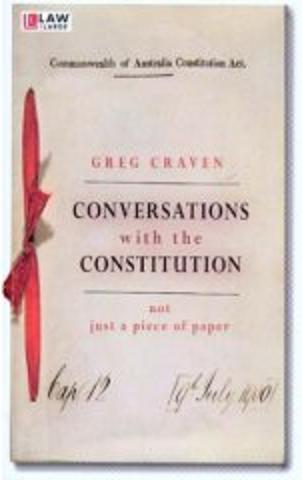Conversations with the Constitution: Not just a piece of paper
by Greg Craven
(UNSW Press, 2004, 250 pages $34.95)

"Most books about the Australian Constitution are as dense as the more impenetrable physical elements, and contain about as many laughs as a jumbo jet disaster". It is with this in mind that Greg Craven, Professor of Government and Constitutional Law at Curtin University, has written something that is perceptive, thoughtful and convincing. And yes, it even provides a few laughs.
Craven's argument is simple and has profound consequences. Put simply, it goes like this. The Australian Constitution has been central to establishing the nation as a liberal and successful democracy. Certainly Australia isn't perfect, but no society is. But we are still more perfect than most. The Constitution is more than a set of words -- it embodies a set of beliefs and conventions which, taken together, have served the people well for over a century. Alter the Constitution, and you alter Australia.
Craven pleads for the community to have a better understanding of the Constitution. Perhaps if there were, the High Court would not have been allowed to get away with some of its constitutional vandalism, particularly in relation to the destruction of federalism. Although the electorate intuitively recognises the merits of the Constitution as it is -- witness the failure of numerous referenda -- no such recognition has put a brake on the untrammelled creativity of judges. The Constitution has democratic legitimacy. So do our State and Federal MPs. Judges don't.
Conversations with the Constitution is more than just an historical analysis of the benefits of the Constitution. What will infuriate Craven's confrères in law schools around the country is his demolition of all of the reasons usually suggested as to why High Court judges should be free to do with the Constitution as they please. What Craven identifies is that when the Constitution's critics bemoan its failings, it is only because the Constitution can't be used, try as hard as some might, to turn Australia into a centralised, semi-socialised, rights-for-everyone (and everything) nirvana. The point Craven makes is not about whether Australia should or should not be turned into such a place. His point is that the decision to transform Australia into Scandinavia is one that requires a democratic vote. It is not within the gift of judges.
Inevitably, those who disagree with Craven -- most legal academics and most of the political Left -- will interpret his position as merely supporting the status quo. Unfortunately, nothing could be further from the truth. Craven's suggestion, for example, that an elected parliament is the best guarantor of rights, could once quite reasonably have been characterised as being "conservative". No longer.
Sadly, in the context of the damage that has already been wrought to the Constitution, it is Craven's suggestion that it should be interpreted in accordance with the intentions of the Founding Fathers that is "radical". There would hardly be a law student in the country who hasn't been inculcated by their lecturers in the belief that only judges can protect human rights. As Craven says about judges having such powers, "It is difficult to imagine a group of humanity outside an enclosed convent or asylum less suited to undertake the business of radical constitutional renovation".
Craven covers the gamut of constitutional issues ranging from citizens initiated referenda -- this is the "Australian constitutional equivalent of streaking at a Test match: appealingly audacious, but presenting numerous ancillary problems" -- to the country becoming a republic -- "the reality of the Australian monarchy is that, whatever its symbolic significance, it has the practical importance of feng shui in the daily functioning of Australian democracy".
The only possible problem with Conversations with the Constitution is that it is endorsed by Michael Kirby, the High Court judge who in recent times has probably done the most to frustrate the constitutional intentions of the Founding Fathers. In this case, however, Kirby is definitely correct in his assessment of Craven's work -- "A blunderbuss of a book ... from his larrikin prose may emerge a heightened interest in the Constitution which, for most Australians, is a black hole of ignorance and indifference".
No comments:
Post a Comment